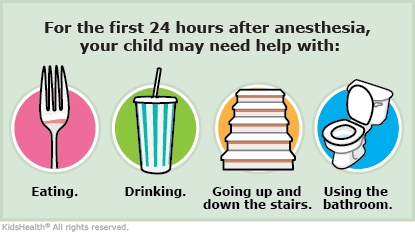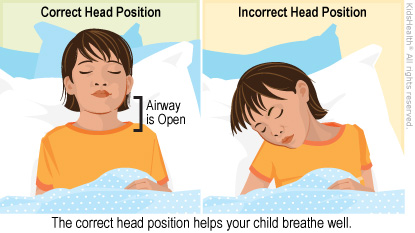After Anesthesia: How to Care for Your Child Over 2 Years Old
Anesthesia is a type of medicine that keeps kids comfortable and asleep during a test, procedure or surgery. Anesthesia can take up to 24 hours to wear off completely. Kids can sometimes feel sick to their stomach or be off balance while recovering. Watch your child carefully until he or she is back to normal.


Keep your child's head up:
Be sure to support your child's head. Children may have less head control while anesthesia or pain medicines are wearing off.

Offer food and drink slowly:
-
Wait to offer your child food or drink until after the car ride home.
-
If your child goes back to sleep at home, periodically wake him or her to eat and drink to avoid dehydration.
-
Make sure your child is fully awake before offering food or drink. Follow these steps:
-
Start with clear liquids. An electrolyte solution is best. Brand names are Pedialyte® and Enfalyte® (supermarkets and drugstores often have a store brand). You also can offer:
-
sports drinks, such as Gatorade® or Powerade®
-
frozen electrolyte pops (such as Pedialyte® or a store brand)
-
water ice, flavored gelatin, ginger ale
-
water mixed with a little apple juice. (Don't give plain water if your child has an upset stomach.)
-
When your child can drink clear liquids without a problem, try milk or other liquids your child usually drinks.
-
When your child can drink liquids, next try solid foods. Start with foods that are low in fat and easy to digest, such as toast, crackers, cereal, rice or mashed potatoes.
If your child needs to take prescription medicines, give them as directed but only when your child is awake and not throwing up.
If your child throws up, follow these steps:
-
Don't give your child anything to drink for about 1 hour.
-
After 1 hour, offer small sips of clear fluids. Give 1 teaspoon for younger children or 1 tablespoon for older kids every 5–10 minutes for 1–2 hours. During this time, increase the amount every 15 minutes.
-
If your child hasn't thrown up after tolerating clear liquid for a few hours, offer small amounts of plain foods, such as toast, crackers, cereal, rice or mashed potatoes.
-
After your child tolerates plain foods, go back to offering a regular healthy, low-fat diet.
If your child throws up again, wait 1 hour, then start over with a smaller amount of liquid.
Help your child get around safely:
Prevent falls or injury until your child's balance is back to normal.
For 24 hours:
-
Don't let your child do anything that takes strength or balance, such as swimming, riding a bike, or climbing stairs alone.
-
A young child might need help with walking and going to the bathroom.
-
Have your child do quiet activities, like looking at books or watching movies.
-
Teens:
Getting back to activities:
-
Your child can return to normal activities when fully awake and acting, eating and drinking normally. This is usually after about 24 hours.
-
If the health care provider gave you specific instructions about returning to activities, be sure your child follows them, even if he or she seems back to normal.

Your child:
-
has noisy breathing that is new or unusual
-
has vomiting that lasts more than 4 hours after leaving the hospital
-
throws up vomit that is bright green or yellow
-
is unable to drink more than 8 hours after leaving the hospital
-
seems dehydrated. Signs of dehydration include:
-
develops a fever higher than 101°F (38.4°C)
-
is still very tired more than 6–8 hours after you left the hospital
-
has pain that does not get better after following instructions for pain medicine

Your child:
Call 911 if you feel your child is having an emergency.

Will my child remember what happened while under anesthesia? No. Anesthesia helps kids forget what happened from the time the medicine is given until it wears off. Anesthesia does not affect memories made before surgery.
What if my child throws up? Kids sometimes throw up after getting anesthesia. It can last for a few hours until the medicine wears off. Kids can get dehydrated from vomiting too much. Help prevent dehydration by giving your child drinks slowly. Call your medical team if the vomiting lasts more than 4 hours or the vomit is bright green or yellow.